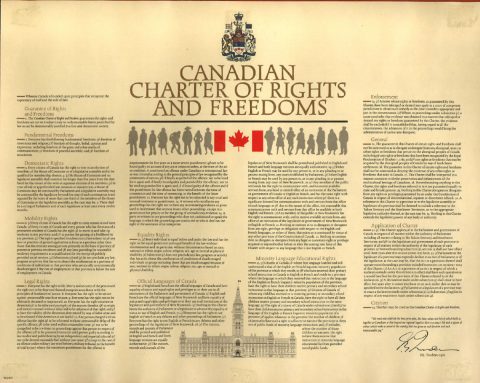I am an equal opportunity feminist. That is, I demand the removal of all barriers to women’s advance in the political and professional realms. However, I oppose special protections for women, such as workplace quotas or campus procedures that favor women during sexual assault complaints. I want total equality before the law.
In my view, special protections of any kind infantilize women. My code of Amazon feminism is based on the empowerment of the individual: Women must not regress to a pre-feminist past to become passive wards of the state.
Camille Paglia, interviewed in “Feminist critic Camille Paglia: ‘Merkel is an important role model for mature women'”, DW, 2017-06-01.
October 29, 2022
QotD: Camille Paglia’s “Amazon” Feminism
September 27, 2022
Is Kayla Lemieux the leading edge of LGBT tolerance or a “dude gaming the system”?
Back on September 16, I posted a link to the then-breaking story of the teacher in Halton whose prosthetic breasts had poked into news headlines everywhere: “This is either the teacher of the year (come on, you know that’s inevitable because reasons) or someone doing an epic physical and psychological parody of our culture right now.” It’s nearly two weeks later, and we’re still not really clear on which of those two possibilities is closest to the truth. At PJ Media, Athena Thorne is making a case for the epic prank case:
There is the most titillating rumor being bandied about the interwebs right now. And while it may or may not be true, it’s certainly food for thought. It concerns “Kayla Lemieux”, the infamous trans-woman shop teacher at Oakville Trafalgar High School (OTHS) in Ontario, Canada.
An anonymous poster on an online forum recently made a claim about Lemieux’s shop class back when “Kayla” was still Mr. Kerry Luc Lemieux. The post reads:
This dude is gaming the system. An anon here yesterday was in this dude’s class. This teacher was almost fired for ‘toxic masculinity’ last year, as well as not embracing woke culture. He’d drop redpills to his class, such as how silly gender neutral bathrooms are. The school board hates him.
He’s now upping the ante to exploit the very clown world the school and society itself created. His long game is most likely to get fired, and then sue for discrimination. There is no other explanation… No better way to troll clown world than to become an over-the-top caricature of a woman.
File this allegation under “Huge if True” (lol). Imagine for a moment that the anonymous person is telling the truth. If that is the case, then this teacher is the greatest hero the sane world has fronted yet.
If Lemieux is indeed pranking the school board, then he is a genius. When images of the trans-busty high school shop teacher began spreading like wildfire online, the outrage was swift and formidable. OTHS and the Halton District School Board (HDSB) went on the defensive — and it quickly became evident that they had painted themselves into a corner with their mindless commitment to “inclusion”.
“We are aware of discussion on social media and in the media regarding Oakville Trafalgar High School. We would like to take this opportunity to reiterate to our community that we are committed to establishing and maintaining a safe, caring, inclusive, equitable and welcoming learning and working environment for all students and staff”, said OTHS in an email sent to parents and obtained by feminist news site Reduxx.
August 30, 2022
The plasticity of language, slippery definitions, and the ongoing gender wars
In The Line, Allan Stratton considers some of the reasons for misunderstanding, argument, and anger in the suddenly huge gender wars in western culture:

Two people at EuroPride 2019 in Vienna holding an LGBTQ+ pride rainbow flag featuring a design by Daniel Quasar; this variation of the rainbow flag was initially promoted as “Progress” a PRIDE Flag Reboot.
Photo by Bojan Cvetanović via Wikimedia Commons.
From my perspective, much of the controversy stems from academic redefinitions of language and concepts over the past 60 years. As these changes affected a small subculture, mainstream society paid them no mind. But language has consequences.
I’m a gay man in his early seventies, who’s paid close attention to the decades of linguistic manipulations that have turned sense into nonsense. Once, words and concepts had clear understandings that helped to create widespread support for LGBT rights. More recently, they have been conflated and inverted, and threaten to negatively affect the rights of women, the safety of gender-nonconforming children, and the lives of gays, lesbians, and transexuals.
A quick primer on the change in key terms may help to clarify our current mess and suggest a way forward:
Today the trans umbrella is understood to be a single movement within the Alphabet alliance, but in 1960s North America, it referred to three specific groups: self-identified transsexuals, transvestites and transgenders. There was some overlap, but none of the three were specifically attached to the fight for gay rights at all.
Transsexuals gained public prominence thanks to American Christine Jorgensen. After serving in the United States Army, Jorgensen had a sex change operation in Denmark before returning to America in 1953. She never identified as homosexual, but, rather, said she had born in the wrong body. Jorgenson was extraordinarily popular. I urge you to watch these two interviews, one from the ’60s and the other from the ’80s. Her wit, charm, self-assurance and intelligence demonstrate the power of persuasion, especially notable at a time far less tolerant than our own.
Transvestites (a term now considered derogatory) dressed and used the pronouns of the opposite sex, but fully acknowledged the material reality of their biology. Some were gay like the legendary Sylvia Rivera and Marsha P. Norman, who co-founded Street Transvestite Action Revolutionaries. Most, however, were straight men like Virginia Prince, who published Transvestia Magazine, founded the Society for the Second Self, and published the classic How to be Woman Though Male. They distanced themselves from the gay community, fearing the association hurt their image. “True transvestites,” Prince assured, “are exclusively heterosexual … The transvestite values his male organs, enjoys using them and does not desire them removed.”
The term transgender, coined by psychiatrist John Oliven in 1965, was designed to distinguish transsexuals, who wanted to surgically change sex, from transvestites, whose inclinations were limited to gendered feelings and presentation. But its definition soon morphed to ungainly proportions. By the ’90s, trans academic Susan Stryker had re-re-re-defined it as (deep breath) “all identities or practices that cross over, cut across, move between, or otherwise queer socially constructed sex/gender boundaries (including, but not limited to) transsexuality, heterosexual transvestism, gay drag, butch lesbianism, and such non-European identities as the Native American berdache (now 2 Spirit) or the Indian Hijra.”
It’s key to remember that, at this time, trans people typically considered themselves the opposite sex spiritually and socially, but not literally: To repeat, trans women like Virginia Price insisted they were straight male heterosexuals, and would have been outraged at the suggestion that they were lesbians. As a result, women’s rights were never infringed. No one insisted that “sexual attraction” and “biologically sexed bodies” be defined out of existence. Nor were “tomboys” and “sissies” expected to seek gender clinics or consider puberty blockers, cross-sex hormones and surgery.
Under those circumstances, trans people gradually gained public support for human and civil rights protections. It’s easy to empathize with the distress of feeling trapped in the wrong body, and the horror of wanting to claw one’s way out. And how can a live-and-let-live world justify discrimination against people for simply wanting to imagine and present themselves as they wish? Progress, though imperfect and incomplete, was real.
But, as we have seen practically every day in the last few years, for true Progressives, mere “progress” isn’t enough and there are no waypoints on the road to Utopia…
July 5, 2022
QotD: The Great Enrichment
The explanation of the Great Enrichment is people. Paul Romer says so, as do a few others, among whom are some students I did not teach price theory to at the University of Chicago. On the other hand, Paul sets it down to economies of scale, which mysteriously drop down on England in the 18th century and gradually on us all. Yet China had peace, science, and enormous cities when Europeans were huddled in small groups inside town walls, or isolated villae.
In particular, it is ideas that people have for commercially tested betterment that matter. Consider alternating-current electricity, cardboard boxes, the little black dress, The Pill, cheap food, literacy, antibiotics, airplanes, steam engines, screw-making machines, railways, universities, cheap steel, sewers, plate glass, forward markets, universal literacy, running water, science, reinforced concrete, secret voting, bicycles, automobiles, limited access highways, free speech, washing machines, detergents, air conditioning, containerization, free trade, computers, the cloud, smart phones, and Bob Gordon’s favorite, window screens. …
And the Great Enrichment depended on the less famous [but] crucial multitudes of free lunches prepared by the alert worker and the liberated shopkeeper rushing about, each with her own little project for profit and pleasure. Sometimes, unexpectedly, the little projects became big projects, such as John Mackey’s one Whole Foods store in Austin, Texas resulting in 479 stores in the U.S. and the U.K., or Jim Walton’s one Walmart in Bentonville, Arkansas resulting in 11,718 stores worldwide.
Letting people “have a go” to implement such ideas for commercially tested betterment is the crux. It comes, in turn, from liberalism, Adam Smith’s “obvious and simple system of natural liberty”, “the liberal plan of [social] equality, [economic] liberty, and [legal] justice”. Liberalism permitted, encouraged, honored an ideology of “innovism” — a word preferable to the highly misleading word “capitalism,” with its erroneous suggestion that the modern world was and is initiated by piling up bricks and bachelors’ degrees.
Dierdre McCloskey, “How Growth Happens: Liberalism, Innovism, and the Great Enrichment (Preliminary version)” [PDF], 2018-11-29.
January 28, 2022
QotD: The Myth of Spartan Equality
This idea – the degree of equality and cohesion – is what I prefer to call the Myth of Spartan Equality, and it’s going to be our target today.
Where does this idea come from? Well, it comes from the same pro-Spartan sources we discussed last time. Plutarch claims that Lycurgus‘ decision to banish money from Sparta essentially removed greed by making all of the Spartans equal (Plut. Lyc. 9.1-4) – or equally poor – though we should note that Plutarch is writing 900 years after Lycurgus (again, probably not a real person) was supposed to have lived. Xenophon notes approvingly that Lycurgus forbade the Spartans from engaging in productive business of any kind, making them thus unable to accumulate wealth (Xen. Lac. 7.1-6). Land was supposed to be distributed equally to each full Spartan citizen – the spartiates or homoioi (we’ll define these terms in a second) in equal plots called kleroi.
This idea – the Myth of Spartan Equality – is perhaps the single “biggest idea” in the conception of the Spartan state, rivaled only by the myth of Spartan military excellence (don’t worry, we’ll get there!). There is something deeply appealing, at a bedrock emotional level, to the idea of a perfectly equal society like that. And that myth of equality has prompted all sorts of thinkers from all sorts of eras (Rousseau, most famously) – including our own – to be willing to look past Sparta’s many, many failings.
And on the face of it, it does sound like a very equal society – practically a collectivist utopia. It is a pleasant vision. Unfortunately, it is also a lie.
[…] every Greek polis had a three-level layer-cake of status: the citizen body, free non-citizens (like foreigners), and non-free persons (slaves). You could – and the Greeks did – divide that top group by wealth and birth and so on, but we’ll get to that a bit later in this post and the next. For now, let’s stick with the three-level layer cake. Sparta follows this scheme neatly.
At the top were the Spartiates, the full-citizen male Spartans. According to Herodotus there were once 8,000 of these (Hdt. 7.234.2); supposedly 9,000 based on the initial number of equal land plots (kleroi) handed out (Plut. Lyc. 8.3 – or rather than saying “handed out” we might say “seized”). Of course these are tallies of Spartiate males, but women could be of citizen stock (but not citizens themselves) and we ought to imagine an equal number of spartiate women at any given time. For a child to be born into the citizen class (and thus eligible for the agoge and future full citizenship), he had to have a citizen father and a citizen mother. We’ll deal with the bastards a bit further down. Also, the spartiates were often also called the homoioi, sometimes translated as “peers” but literally meaning something like “the equals”. As we’ll see, that equality is notional at best, but this ideal of citizen equality was something Sparta advertised about itself.
[…]
But the final word on if we should consider the helots fully non-free is in their sanctity of person: they had none, at all, whatsoever. Every year, in autumn by ritual, the five Spartan magistrates known as the ephors declared war between Sparta and the helots – Sparta essentially declares war on part of itself – so that any spartiate might kill any helot without legal or religious repercussions (Plut. Lyc. 28.4; note also Hdt. 4.146.2). Isocrates – admittedly a decidedly anti-Spartan voice – notes that it was a religious, if not legal, infraction to kill slaves everywhere in Greece except Sparta (Isoc. 12.181). As a matter of Athenian law, killing a slave was still murder (the same is true in Roman law). One assumes these rules were often ignored by slave-holders of course – we know that many such laws in the American South were routinely flouted. Slavery is, after all, a brutal and inhuman institution by its very nature. The absence of any taboo – legal or religious – against the killing of helots marks the institution as uncommonly brutal not merely by Greek standards, but by world-historical standards.
We may safely conclude that the helots were not only enslaved persons, but that of all slaves, they had some of the fewest protections – effectively none, not even protections in-name-only.
Bret Devereaux, “Collections: This. Isn’t. Sparta. Part II: Spartan Equality”, A Collection of Unmitigated Pedantry, 2019-08-23.
December 16, 2021
The Charter of Rights and Freedoms versus Quebec’s Bill 21 (Loi sur la laïcité de l’État)
Andrew Potter characterizes our next big constitutional bun-fight as an exploded time-bomb in the Canadian Charter of Rights and Freedoms:
In 1982, Prime Minister Pierre Trudeau and the provincial premiers inserted a time bomb into the Canadian constitution. It finally went off last week, when an elementary school teacher in West Quebec was removed from the classroom for wearing a hijab, in violation of Bill 21, the province’s secularism law.
The case has generated no shortage of outraged commentary in Canada and abroad, with many denouncing what they see as the “bigotry” of the Quebec law. In The Line on Tuesday, Ken Boessenkool and Jamie Carroll argued that far from implementing a secular state, Quebec has simply imposed a state religion that takes precedence over private belief. In response to these criticisms, many Quebecers say that this is just another round of Quebec bashing. The rest of Canada needs to recognize that the province is different, and to mind its own business.
But it is important to realize that something like this was going to happen sooner or later. The patriation of the constitution and the adoption of the Charter of Rights and Freedoms in 1982 seriously destabilized the Canadian constitutional order, and the twin efforts of the Meech Lake and Charlottetown accords to fix that instability only made things worse. But the real ticking bomb here is s.33 of the Charter, a.k.a. the notwithstanding clause, which allows legislatures to override certain sections of the Charter for renewable five-year terms.
The basic tension is between two more or less incompatible views of the country. On the one hand there is the original concept of a federal Canada, where citizens’ political identities are shaped by and through their relationship with their provincial, and to a lesser extent, national, governments. On the other hand, the Charter created a newer understanding of Canadians as individual rights bearers with political and social identities prior to the state, underwritten by the Charter itself.
October 24, 2021
Andrew Sullivan – “They are the Dana Carvey church ladies of our time, except instead of saying ‘Could it be Satan?!’ when confronting some cultural or moral transgression, they turn to the camera, clutch their pearls, and say ‘Could it be whiteness?!'”
Andrew Sullivan on what he titles “The Betrayal Of Our Gay Inheritance”:
It was, as it turned out, a bit of a non-event. The walkout by transgender Netflix employees and their supporters to demand that the company take down and apologize for the latest Chappelle special attracted “dozens”, despite media hype.
But the scenes were nonetheless revealing. A self-promoting jokester showed up with a placard with the words “We Like Jokes” and “We Like Dave” to represent an opposing view. He was swiftly accosted by a man who ripped the poster apart, leaving the dude with just a stick, prompting the assailant to shout “He’s got a weapon!” Pushed back by other protestors, he was then confronted by a woman right in front of him — shaking a tambourine — and yelling repeatedly into his face: “Repent, motherfucker! Repent! Repent!”
This is the state of what’s left of the gay rights movement in America. Judgmental, absolutist, intolerant, and hysterical, it looks to shut down speech it dislikes, drive its foes out of the public square, compile enemies’ lists of dangerous writers, artists, and politicians, and cancel and protest anything that does not comport with every tiny aspect of their increasingly deranged ideology.
The generation that now leads the movement does not seem to know the actual history of the gay rights movement, or the centrality of free expression to gay identity. They also seem to have no idea of the history of the movement against gay rights. Because if they did, they might be shocked at the ironies involved.
Anti-gay forces, hegemonic for centuries, were just like these trans activists. They were just as intent on suppressing and stigmatizing magazines, shows, and movies they believed were harmful. They too targeted individual artists and writers for personal destruction. They too believed that movies and comedy needed to be reined in order to prevent social harm. They protested in front of movie theaters. They tried to get shows canceled. And if you’d marched in any gay demo or Pride in the 1990s, you’d always be prepared to confront a grimacing Christianist yelling “Repent! Repent!” in your face.
In fact, it’s hard not to see the trans far left as a farcical replay of the Religious Right of the past. They are the Dana Carvey church ladies of our time, except instead of saying “Could it be Satan?!” when confronting some cultural or moral transgression, they turn to the camera, clutch their pearls, and say “Could it be whiteness?!”
This was never, ever the spirit of the gay rights movement in the past. In fact, it was America’s guarantee of free expression and free association that made the gay rights movement possible. It was the First Amendment, and the spirit of the First Amendment, that was easily the most important right for gays for decades. From the fledgling Society for Human Rights, formed in Chicago in 1924, and its pioneering magazine, Friendship and Freedom, to the struggles against censorship in the 1950s, with One Magazine, and erotic Physique pamphlets under siege, it was the First Amendment that, especially under Oliver Wendell Holmes, allowed gay people to find each other, to develop arguments for their own dignity and self-worth, and to sustain free associations when the entire society viewed them as perverts and undesirables and child molesters.
October 10, 2021
First the Bloc Québécois, then “Wexit”, now Bloc Montréal?
Barbara Kay makes the case for Montreal to re-evaluate its position within Quebec as the Quebec government pushes toward even more legal efforts to reduce the English-speaking community to a second- or even third-class citizenship:
Oct. 7 brought an end to consultations on Quebec’s Bill 96, which amends the 1977 Charter of the French Language (Bill 101) and — unilaterally, never before attempted by a province — the Constitution Act of 1867. A few anglophone institutions were invited to the hearings, but their inclusion was pro forma. Bill 96 will pass through use of the notwithstanding clause.
The bill affirms Quebec is a nation, with French as its “common” as well as its only official language, adding several new “fundamental language rights” for French. It effectively creates both a Canadian and Quebec Charter-free zone in a wide range of interactions between individuals and the state. Even before passage, use of the P-word (“province”) has become politically charged, and quietly redacted from public usage by Bill 96 dissidents.
The impact of Bill 96 on anglophones could be momentous. One amendment, which restricts access to English health and social services to those with education-eligibility certificates, could negatively affect upwards of 500,000 anglophone Quebecers. It speaks volumes that the Minister of the French Language will take responsibility for outcomes delivery in that sector away from the Minister of Health and Social Services. Bill 96 will also negatively affect young francophones by capping their numbers at English cegeps [Collège d’enseignement général et professionnel or “General and Vocational College”].
The previous expansions of French language rights in Quebec — and corresponding contractions of English language rights in the province — drove waves of emigration to other provinces, helping Toronto surpass Montreal as Canada’s largest city and economic powerhouse. In the middle of a pandemic, it’s much harder for those who are feeling oppressed to leave Quebec, but there may be another possibility:
Montreal as a city-state, or at least a special autonomous region — a status the Cree nation of northern Quebec has enjoyed for decades — was first raised as a serious idea eight years ago. In 2013 the Parti Québécois proposed language Bill 14, as draconian as Bill 96, which died when premier Pauline Marois’s minority government couldn’t enlist enough collegial support for its passage. Nevertheless, the attempt galvanized alarm sufficient to inspire a transiently influential city-state movement.
A 2014 Ipsos poll on the subject commissioned by that group elicited these key takeaways from Montrealers: Montreal is a distinct society within Quebec (90 per cent); to stop its decline, Montreal needs to take drastic steps to improve its performance (91 per cent); and Montreal deserves special status within Quebec because it is a world-class, cosmopolitan city (74 per cent). Those numbers would likely be as high or higher today.
[…]
We need a Bloc Montréal to represent Montreal/Greater Montreal’s “distinct society” at the Quebec National Assembly in Quebec City. The pivotal moment of the 1995 referendum campaign was the revelation — one that had never before occurred to the separatists — that “if Canada is divisible, then Quebec is divisible”. That was a sobering and clarifying moment. And Montreal has a greater need for augmented representation in Quebec City than Quebec has in Ottawa. After all, Quebec profits handsomely from its affiliation with Canada, while the opposite is true of Montreal and Quebec City.
September 29, 2021
If you squint carefully, you can pretend this is a “win” for equal rights …
In Tuesday’s NP Platformed newsletter, Colby Cosh “celebrates” the elimination of another barrier to American women achieving truly equal rights with American men:

“Soldiers complete a 5K in preparation for a jungle operations training course at Schofield Barracks, Hawaii, May 12, 2021”
US Army photo by Spc. Jessica Scott.
Congratulations to the women of the United States, who took a big step toward full equality before the law last week. The punchline, if you want to call it that, is that this step was: “At long last, the ladies are eligible for military conscription.” Both houses of Congress have now passed versions of the annual military appropriations bill, which open the U.S. Selective Service System to females as well as males.
Conservative diehards on the Republican side were outnumbered nearly three to one in Thursday’s House vote, and while the House and Senate bills still have to be matched up for presentation to the president, the day of inverse liberation for young women seems imminent.
The whole thing is one of those mysteries of American tradition that naturally confuse citizens of other countries. Most of the European countries that require military service (or some substitute for conscientious objectors) are still unapologetically all-male. Israel, where military conscription is continuous and urgent and the armed services are perhaps the world’s most co-ed, actively drafts both sexes; the requirements are a touch more rigorous for the men. Norway registers both sexes for “mandatory” military service, but the instructional programs and the military generally are lightly funded at best, so only a fraction of the draftees are put to any trouble.
[…]
The minimum of debate that female draft registration has received is mostly concerned with the vague social implications of the hitherto existing one-sex policy. It’s perhaps a little awkward that boys have to undergo the weird rite of Selective Service passage — whether or not they are capable, physically or ethically, of fighting — and that girls don’t. Tough Republican-type women soldiers advocated for removing the sex discrimination because young females ought to know that they share responsibility for national defence and that the military is open to them. Oddly, no one (apart from Reason magazine) seems to concern themselves much with the social implications of the state being able to subject everybody to servitude and danger, and having a giant apparatus that exists to remind them of this subjection.
The way Reason magazine has been tacking hard to the left over the last five years means I’m actually mildly surprised that they bothered to point out the minor issue that conscription is a form of slavery …
September 24, 2021
QotD: The LGBT advocacy group Stonewall proves Hoffer right — “every great cause begins as a movement, becomes a business and eventually degenerates into a racket”
There is a law of nature that governs campaigning groups and charities, which is that an organisation set up to deal with a particular problem will always find a way to exist even after that problem has been addressed.
The reason is simple: by the time an issue has been solved, or almost solved, the business is at its peak. Employees’ salaries and pensions are at stake, reputations have been built and influence has been secured. And so it is that Eric Hoffer’s great insight is fulfilled: every great cause begins as a movement, becomes a business and eventually degenerates into a racket.
Very few causes have degenerated into a racket so completely as the former gay-rights group known as Stonewall. When it was founded in 1989, gay rights in Britain, as across Europe, had some way to go to reach equality. Back then, there was a different age of consent for homosexuals and heterosexuals, homosexuals did not have the right to marry or to have their partnerships legally recognised and, most pertinently, a Conservative government had made it impossible for young gay people to be in any way informed about their sexuality during their time at school.
There was certainly a long way to go, and Ian McKellen, Matthew Parris, Simon Fanshawe and the rest of the group’s founders faced an uphill battle for many years. But it was a battle which they helped to win.
Once most of their objectives had been achieved, though, what were Stonewall to do? There were several options in front of them. The most obvious, one might think, would have been to scale down and remain in place to deal with residual issues, such as the existence of homophobia in schools and other remaining pockets of society.
Douglas Murray, “How Stonewall sacrificed gay rights”, UnHerd, 2021-05-25.
June 28, 2021
QotD: Urbanization
The environmentalist aesthetic is to love villages and despise cities. My mind got changed on the subject a few years ago by an Indian acquaintance who told me that in Indian villages the women obeyed their husbands and family elders, pounded grain, and sang. But, the acquaintance explained, when Indian women immigrated to cities, they got jobs, started businesses, and demanded their children be educated. They became more independent, as they became less fundamentalist in their religious beliefs. Urbanization is the most massive and sudden shift of humanity in its history.
Stewart Brand, “Environmental Heresies”, Technology Review, 2005-05
June 20, 2021
L’Affaire Annamie Paul – “… it’s like every Liberal across the land forgot about politics”
The weekly wrap-up from The Line wonders why Canadian media outlets pay so much attention to the Green Party (far in excess of their political influence normally), but recent Green Party fratricidal bun-fighting merits attention just because of the injured bystander, the Prime Minister of the current year:
The background of all of this is complicated, and we’re not going to bother recapping it. If you care enough about Canadian politics to follow the Greens, you know it all already. What’s interesting to us — and funny as all hell — is how angry the PM’s die-hard fanbase was, how shocked and sincerely surprised they were, when Paul turned her guns on the PM instead of her own rebelling party executives and grassroots:
“To the prime minister, Justin Trudeau,” Paul said at a press conference, “I say to you today, you are no ally. And you are no feminist. Your deeds and your words over these past weeks prove that definitively. A real ally and feminist doesn’t end their commitment to those principles whenever they come up against their personal ambition.”
And, gosh. Liberals everywhere were just stunned.
It was cute. As we said, it’s like every Liberal across the land forgot about politics. And that’s ridiculous. Canadian Liberals are the most ruthlessly effective vote winners precisely because they are relentlessly amoral and craven. We don’t even mean this as an insult! Your typical Canadian Liberal constitutes the purest sample of raw partisanship known to human science — which is why they’re so good at winning.
And that’s why they should have instantly understood what Paul was doing when she attacked the PM. She was picking a fight she could win because she’s losing the one she’s actually facing. Paul is a black woman. She’s Jewish. She’s obviously lost control of her own party. The only chance in hell she has of surviving is to lay every possible identity group card down on the table, declare herself the champion of those oppressed groups, and then dare her own party to purge her. She’s adopting the mantle of the WOC woke champion. It’s a lot easier for Paul to fight that battle against the PM than it is for her to fight it against her own party.
As much as Liberals hate to admit it — and they really, really, really hate to admit it — the PM is vulnerable to accusations of hypocrisy on the feminism and racial equality files. Obviously.
Paul is desperate. She’s in a fight for her political life, and she seems to be losing. So she’s picked a fight with a powerful white man to play up her own “voice of the oppressed” credentials. It’s cynical and desperate. Frankly, the Liberals ought to be honoured. What’s that they say about imitation and flattery?
April 14, 2021
Schrödinger’s photo ID requirements
Mark Steyn notes the odd inconsistency of US authorities insisting on or ignoring the need for photo ID for different demographics. So much for equal treatment in the United States.

“TSA Checkpoint” by phidauex is licensed under CC BY-NC-SA 2.0
Whenever you fly anywhere in America, you require picture ID — so that, when you get to the head of the great endless security line, the TSA agent can get out his jeweler’s loupe and examine how the ink lies on the paper. And, when he’s finished doing that, he can fish out his UV light to study the watermark on your ID.
Which is all bollocks even by the standards of American security-state bureaucracy. Why bother going to all the tedious trouble of fake ID when real ID is so easy to acquire? On September 11th 2001, four of the terrorists boarded the flight with genuine, valid picture ID issued by the state of Virginia and obtained through the illegal-immigrant day-workers’ network run out of the parking lot of the 7-Eleven in Falls Church.
If that didn’t get Americans mad about the cosseting of the undocumented, I doubt they’ll care a fig about this latest privilege. But I thought it worth mentioning anyway: While you’re stuck with the Loupe & Light guy poring over your ID, the federal government announced last week that migrants crossing the southern border will be permitted to fly within the United States without any valid ID. You’re on orange alert now and forever, they’re in the express check-in.
This is where selective enforcement of the laws always leads — to a broader contempt for all law, and an end to equality before the law. In 2021 no developed nation needs mass unskilled immigration. Some have it for historical reasons — a hangover of empire, as in Britain and France; some have it for sentimentalist pseudo-humanitarian reasons, as in Sweden and Norway. But neither of these rationales account for what the laughably misnamed Department of Homeland Security is doing at America’s southern border.
March 29, 2021
Requiring only men to register for the draft isn’t the real problem — the problem is the draft itself
Kerry McDonald fears that the current challenges to the gender inequality of the US draft may end up making the underlying problem worse:
Currently, all American men are required to register for the draft through the Selective Service System when they turn 18, and could be forced into military service if the draft was activated. As a mom with young sons, I shudder at this prospect.
Lawyers with the American Civil Liberties Union (ACLU) have filed a petition asking the Supreme Court to rule the current military draft registration unconstitutional because it requires only men to register, not women. As a mom with young daughters, I shudder at this prospect.
While draft registration does involve unequal treatment of men and women, and women have been ably serving in the military for years, including in full combat, the larger issue is Selective Service registration itself. Current draft registration may be unconstitutional, but it shouldn’t exist at all.
Forcing citizens into any kind of non-voluntary work or action is antithetical to the principles of a free society.
Some contend that conscription is necessary to defend those principles if there were not enough volunteers to serve in a wartime effort, but is slavery ever justifiable? Who decides? If there are not enough soldiers to willingly fight a war, should the war be fought?
Nobel-Prize-winning economist Milton Friedman was one of the key figures who succeeded in persuading the US to move to an all-volunteer army in 1973, arguing against military conscription. Friedman wrote that “any system involving compulsion is basically inconsistent with a free society.” He went on to argue: “The continued use of compulsion is undesirable and unnecessary. We can and should man our armed forces with volunteers.”
In place of conscription, Friedman advocated for a voluntary military guided by free-market ideas. “The appropriate free market arrangement is volunteer military forces; which is to say, hiring men to serve,” Friedman wrote in his book, Capitalism and Freedom. “There is no justification for not paying whatever price is necessary to attract the required number of men. Present arrangements are inequitable and arbitrary, seriously interfere with the freedom of young men to shape their lives, and probably are even more costly than the market alternative.”
Friedman’s advocacy against conscription came to a climax in testimony with Army Chief of Staff, General William Westmoreland. The general disagreed with Friedman by claiming that the economist’s free-market approach would be akin to leading an army of mercenaries. Friedman replied: “General, would you rather command an army of slaves?”
March 11, 2021
Women’s Vote Leads to Bolshevism and Welfare | B2W: ZEITGEIST! I E.13 – Harvest 1921
TimeGhost History
Published 10 Mar 2021This season not only marks the birth of the American welfare state, but it will also see women make great strides towards universal suffrage. But as you can imagine, none of these things come without significant opposition.
Join us on Patreon: https://www.patreon.com/TimeGhostHistory
Hosted by: Indy Neidell
Written by: Francis van Berkel
Director: Astrid Deinhard
Producers: Astrid Deinhard and Spartacus Olsson
Executive Producers: Astrid Deinhard, Indy Neidell, Spartacus Olsson, Bodo Rittenauer
Creative Producer: Maria Kyhle
Post-Production Director: Wieke Kapteijns
Research by: Francis van Berkel
Edited by: Michał Zbojna
Sound design: Marek KamińskiColorizations:
Daniel Weiss – https://www.facebook.com/TheYankeeCol…
Mikołaj Uchman
KlimbimSources:
Some images from the Library of CongressIcons from The Noun Project:
Birth by Adrien Coquet
dead by AomAm
mother by Fahmihorizon
United States Capitol by József Balázs-Hegedüs
noun_House of Representatives
House of Representatives Full by Sarah LawrenceSoundtracks from Epidemic Sound:
“Epic Adventure Theme 3” – Håkan Eriksson
“You’re Trouble” – Rich in Rags
“I’d Rather Be Alone” – Franz Gordon
“Redefine” – Megan Wofford
“Age Of Men” – Jo WandriniArchive by Screenocean/Reuters https://www.screenocean.com.
A TimeGhost chronological documentary produced by OnLion Entertainment GmbH.
From the comments:
TimeGhost History
2 days ago
America has so far been a pretty big topic in this season, and it again takes center stage in this episode. Considering its monumental role in twentieth-century history, this is only natural. Still, we like to give an international history as possible, so it’s exciting to also introduce Sweden here. It is a small country but historically significant for a number of reasons. It is a pioneer in social democracy, a country that has consistently stayed neutral in world affairs since 1814, and last but not least, the home of Indy Neidell.










